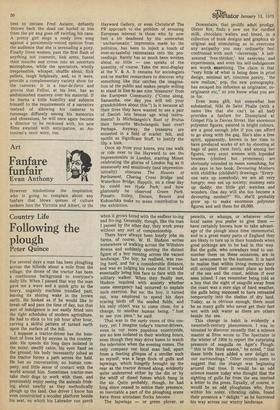Country Life
Following the plough
Peter Quince
For several days a man has been ploughing across the hillside about a mile from the village; the drone of the tractor has been a continuous background to everyone's daily life. When I passed that way the man gave me a wave and a quick grin as the heavy, ungainly machine trundled past, leaving its shining wake in the brown earth. He looked as if he would like to break off and pass the time of day, but that sort of indulgence is not easily fitted into the tight schedules of modern agriculture. He had to stick to his job hour after hour, carving a skilful pattern of turned earth upon the surface of the hill.
I suppose a tractor-driver has the loneliest of lives led by anyone in the countryside. He spends his long days isolated in the noisy, smelly cabin, his eyes fixed on the ground, his body incessantly jolted as the tractor forces a path across the field. He has no conversation, no human company, and little sense of contact with the world around him. Sometimes tractor-men take their dogs to work with them, and presumably enjoy seeing the animals frisking about nearby as they methodically plough up the land. One driver I know has even constructed a wooden platform beside his seat, on which his Labrador can perch when it grows bored with the endless to-ing and fro-ing. Generally, though, like the man I passed by the other day, they work away without any sort of companionship.
There have always been lonely jobs on farms, of course. W. H. Hudson writes somewhere of walking across the Wiltshire downs and suddenly spotting the distant figure of a boy running across the vacant landscape. The boy, he realised, was runing hard, and for a considerable distance, and was so judging his route that it would eventually bring him face to face with the solitary walker. When they finally met, Hudson inquired with anxiety whether some emergency had occurred to explain such exertion. But no: the boy, it turned out, was employed to spend his days scaring birds off the seeded fields, and his only object was to come close, for a change, to another human being. "Just to see you pass," he said.
That was in the early years of this century, yet I imagine today's tractor-drivers, even in our more populous countryside, are no less isolated in their working hours, even though they may drive home to watch the television when the evening comes. The only company our local man had, apart from a fleeting glimpse of a stroller such as myself, was a large flock of gulls and lapwings, which hungrily brought up the rear as the tractor droned along, evidently quite undeterred either by the din or by the whiff of diesel fumes which hung in the air. Quite probably, though, he had long since ceased to notice their presence, so inevitable a part of the ploughing scene have these attendant flocks become.
The lapwings — or green plover, or peewits, or whaups, or whatever other local name you prefer to give them — have certainly known how to take advantage of the plough since time immemorial, and in a great many parts of England they are likely to turn up in their hundreds when good pickings are to be had in this way. But the gulls, who nowadays tend to outnumber them on these occasions, are in fact newcomers to the business. It is hard to realise that within living memory they still occupied their ancient place as birds of the sea and the coast, seldom if ever seen inland. I can remember being told as a boy that the sight of seagulls away from the coast was a sure sign of hard weather, the gulls being supposed to have retreated temporarily into the shelter of dry land. Today, as is obvious enough, there must be as many gulls who never get their feet wet with salt water as there are others beside the sea.
This change in habit is evidently a twentieth-century phenomenon. I was interested to discover recently that a science master at Eton wrote to The Spectator in the winter of 1909 to report the surprising presence of seagulls on Agar's Plough: "this is the third season," he noted, "that these birds have added a new delight to our surroundings." Other records seem to suggest that the change was beginning around that time. It would be an odd science master today who thought that the sighting of gulls far from the sea merited a letter to the press. Equally, of course, it would be an odd ploughman who, from within his noisy, vibrating cabin, found their presence a " delight " as he burrowed his way across our wintry landscape.


































 Previous page
Previous page